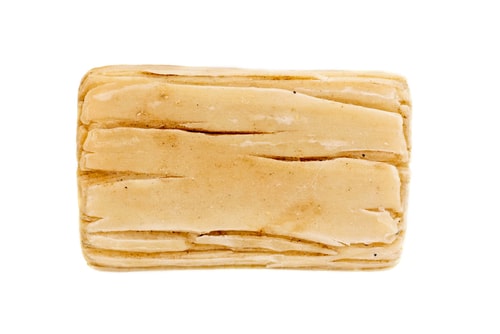Does Goat Milk Soap Expire? This a question we have had a few times and I think it is a great topic to explore!. Because goat milk soap is made with milk, it is a natural assumption by many that there would be an expiration date. There is an expiration date on milk itself, so why not on soap? So let’s dive in!
First, when soap is made, milk is used as the carrier for the reagent, which is lye (sodium hydroxide). If soap is not made with milk, then the carrier is typically just water. But we love adding milk for the natural enzymes, the alpha-hydroxy acid, the vitamins & minerals and of course the luscious, creamy butterfat that works its magic.
During soap production, the fat (cream from the milk) and the plant fats from the oils (olive, coconut etc), react with the sodium hydroxide in a process call saponification. The fats are “saponified” INTO soap. Scientifically speaking, Saponification is a process where triglycerides (vegetable oils or animal fats) actively react with lye to produce naturally occurring skin-worshiping glycerin and a mild fatty acid salt called “soap.”
Goat Milk Soap is Cured
Goat milk soap is typically “cured” for at least a minimum of 4 to 6 weeks to allow the evaporation of excess water (water from the milk). As the water leaves the bar, it becomes harder and denser. With enough time, a bar can become ROCK hard and the wear rate is minimal. Typically, the older a bar is, the longer it will last. So age is actually a friend of handcrafted, artisan soap. We actually prefer that our handmade goat milk soap not hit the market until it is at least 8 weeks old. We are continually building inventory and LOVE any extra time the soap can get.
I read a soap-maker’s website recently who said she ages the soap for 4 weeks, but she would not promise any longer because “demand” took precedence. A very short-sighted view in our opinion. A high-quality soap gets better with TIME.
Does Goat Milk Still Exist in Soap?
Consumers fear mold, mildew and bacteria developing due to the milk used. But in order for these to gain a foothold in anything, significant moisture has to be present. Curing soap should be devoid of moisture. REMEMBER, the fats in the milk have been converted into soap molecules along with their skin friendly benefits. But milk in its original, bacteria prone form, no longer exists. It has been converted in its entirety into a dry, nutritive form.
Bar soap does not need a preservative.
There is no water present to get the ball rolling in the first place. It is a DRY product,
Having seen or experienced “bad” soap, consumers can be made wary of natural soap. Nine times out of ten, this is due to improperly made soap, lack of experience by the maker, short-cuts, rushing a batch, bad recipes have used either too little or too much lye and honestly, not understanding the actual chemistry behind the soap-making process.
Some soap-makers believe soap is a way to use up their “old” oils rather than throw them away. The use of a rancid oil is why soaps develop the dreaded oxidative “orange spots”. Orange spots don’t smell good, but they are not dangerous. Rancidity is the deterioration of oils and fats. There are multiple types of rancidity including hydrolytic, microbial and oxidative.
Soap Maker’s Mistakes
Customers have shown me soap they purchased that “leaks oil”. (the maker did not use enough lye). I have seen samples that crumble in your hand (too much lye), that have soft spots (not blended well), washes away rapidly (not cured long enough), does not lather (recipe is unbalanced), and I can go on and on.
So, in a nutshell, properly made goat milk soap, will not spoil, go bad or expire. Soap can last for 10 – 20 years if kept in a dry, cool spot in the home. If high quality fragrance oils are used, the scent can last for years as well. If essential oils were used in the soap, the scent will slowly diminish over time. Essential oil molecules are much smaller and lighter in weight than fragrance molecules. It is like comparing a pea to a bowling ball. In time, essential oils will evaporate, and the scent will lessen. There is nothing a maker can do about this, it is the natural progression of using a “natural” ingredient.
Soap is like concrete; it never truly stops curing. (The concrete in the Hoover Dam is still curing to this day.) So appreciate those older bars of soap. They are like a fine wine, improving with age.


